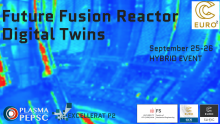Course/Event Essentials
Training Content and Scope
Other Information
Plasma-PEPSC and EXCELLERAT-P2 centers of excellence invite you to a detailed two-day training about simulations in the field of nuclear fusion reactors, digital twins and high performance computing. This event will connect experts and enthusiasts in research of advanced simulation techniques in the field of nuclear fusion, plasma physics and scientific use of supercomputing.
HPC simulations will play an important role in the future design of nuclear fusion reactors. Since the experiments are expensive, a lot of focus is directed to the development of high-performance codes in the field of nuclear fusion. HPC enables scientists to simulate extreme conditions in a fusion reactor in a precise manner, which is of great help in understanding the behavior of plasma in magnetically confined plasma devices. Programming codes used within Excellerat P2 and Plasma-PEPSC are used on HPC infrastructure to simulate plasma physics and response of diagnostic systems which measure different plasma properties, for example radiation distribution and temperature of first wall with IR camera. Accurate simulation can tell us what kind of signals to expect from the IR camera for specific plasma configurations. Key output is better understanding of plasma behavior to improve efficiency of magnetically confined fusion devices.
The role of Plasma-PEPSC is to develop plasma physics codes that deal with the behavior in the scrape-off layer region and to port the codes to HPC infrastructure towards peta- and exa-scale. The Excellerat P2 use case, dedicated to nuclear fusion, aims to develop ray tracing algorithms to simulate light propagation and prepare them for exa-scale simulation. At the workshop, users will prepare basic cases and learn how to use such codes on HPC infrastructure.



